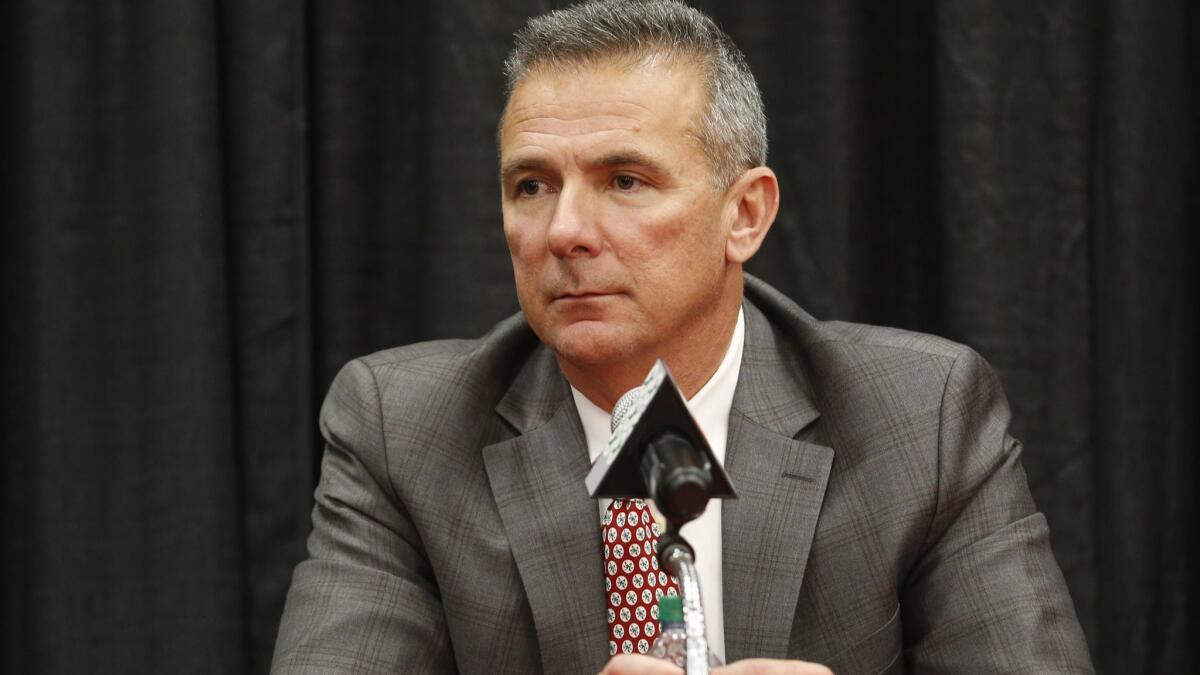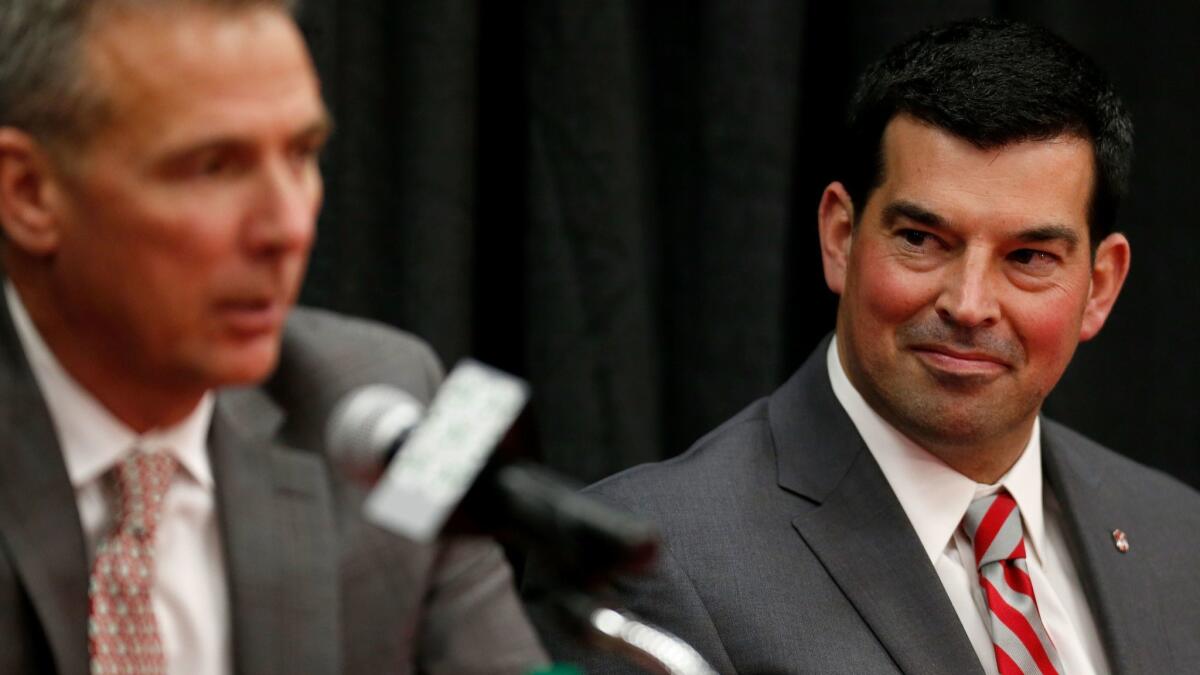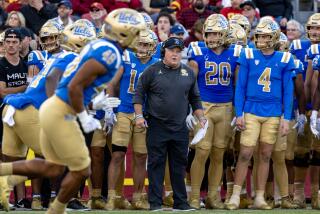Did Urban Meyer do things the ‘right way’ as a college football coach? The debate continues

The question of legacy was bound to pop up.
As Urban Meyer faced a roomful of reporters to announce his retirement, the Ohio State football coach was asked about how he might be remembered.
“I can lie to you and say that’s not important to me,” he responded. “Any human being, that’s important to.”
Three national championships and an 85% winning percentage surely place Meyer among the greatest coaches in the history of the college game, but numbers tell only part of his story.
The 54-year-old has endured a particularly rough season, marked by negative headlines and a three-game suspension for the mishandling of domestic-violence allegations against one of his assistants. The incident revived troubling questions about how he ran his team at a previous school.
This is where the legacy question gets tricky. Will the issue be stamped on his permanent record?
Meyer, for one, ventured a guess.
“I’m sure it will,” he said.
At the very least, the controversy played a role in the Tuesday announcement that he will leave the No. 6 Buckeyes after they face No. 9 Washington in the Rose Bowl on Jan. 1. There was another, more-pressing reason.

Twenty or so years ago, doctors discovered an arachnoid cyst on his brain. Despite a 2014 surgery, the condition has continued to cause severe headaches and has been exacerbated by Meyer’s work habits.
“The style of coaching that I’ve done for 33 years is very intense, very demanding,” he said. “I tried to delegate more … and the product started to fail. I had to go right back.”
During at game at Maryland in mid-November, pain caused him to double over on the sideline.
As rumors of his departure intensified and recruits began asking questions, Meyer believed he needed to act before the early signing period this month. A decision was reached in conversations with athletic director Gene Smith in the days after Ohio State defeated Northwestern in the Big Ten Conference title game.
“It was very difficult,” Meyer said. “This is all I know.”
It isn’t the first time he has left the game for health reasons. In 2009, after transforming Florida into a Southeastern Conference juggernaut and winning two national championships, he briefly resigned, changed his mind and then left after the next season.
Episodes of dehydration and chest pains drove him away.
“I have ignored my health for years,” he said in 2009 when he announced he was resigning the first time. “But recent developments have forced me to reevaluate my priorities of faith and family.”
Something else about his tenure at Florida resonates with the current situation.
Dozens of Gators players had run-ins with the law during his six seasons in Gainesville. The coach reportedly turned a blind eye to their misbehavior, prompting accusations that he harbored a win-at-all-costs mentality.
On Tuesday, Meyer referenced this notion, saying the reality of major-college coaching means “you have to win every game … that’s something you have to embrace.”
The nobler side of this determination made all the headlines when he came out of retirement in 2011, the Ohio native returning home to coach the Buckeyes.
Meyer was feted for his recruiting savvy and football innovation, especially when it came to designing offenses. These attributes, along with astute game management, figured to revive an Ohio State program that had fallen on hard times.
And they did, the Buckeyes going 24-2 in his first two seasons, then winning a national championship in the 2014 season. As Smith put it: “Urban has a very, very special gift. He is an elite coach.”
But trouble arose last summer when news reports detailed a history of alleged domestic violence involving receivers coach Zach Smith and his then-wife, Courtney.
The first accusation dated back to 2009, when Smith worked on Meyer’s staff at Florida. Another allegation arose in 2015, by which time the men were at Ohio State.
Meyer acknowledged talking to Smith about the first allegation but initially told reporters he had no previous knowledge of the second one. When that proved untrue, the university launched an investigation, placing him on administrative leave just before the start of training camp.
His subsequent three-game suspension angered both hard-core fans of the team and people who had lobbied for something harsher.
“This is one of those circumstances where there is no right answer,” university President Michael V. Drake said. “It is not possible to do something that makes everyone happy.”
Meyer drew further criticism for his demeanor at the news conference announcing the punishment. Critics noted that he looked annoyed and failed to explicitly apologize to Courtney. He later attempted to rectify the situation in a social media post.
After the coach returned to his team in late September, the Buckeyes struggled through a lull before dominating rival Michigan 62-39 in the regular-season finale and barely missing the playoffs.
On Tuesday, Meyer was asked if the controversy and suspension contributed to his decision to retire.
“Sure,” he said.
Ohio State selected offensive coordinator Ryan Day, who filled in during the suspension, as Meyer’s permanent replacement. Day talked about striving for continuity.
“We’re all part of something special here at Ohio State and the culture that Urban Meyer has created is strong,” he said.
Though Meyer has now retired three times over the past decade, he expressed relative certainty this time would stick and said he hopes to continue working for the athletic department in some capacity.
“I love Columbus,” he said. “I’ve always been a Buckeye as far back as I can remember.”
The controversial aspects of his career might fade with time, especially in Ohio where fans might prefer to focus on his 7-0 record against the Wolverines.
It could also be that, for better or worse, he embodies the modern big-time coach, paid millions upon millions with an expectation of winning championships.
Speaking to reporters, Meyer insisted he always put the welfare of his athletes first and tried to do things “the right way.” But is that how history will judge him?
“The legacy,” he mused, “you can only control so much.”
Follow @LAtimesWharton on Twitter
More to Read
Get our high school sports newsletter
Prep Rally is devoted to the SoCal high school sports experience, bringing you scores, stories and a behind-the-scenes look at what makes prep sports so popular.
You may occasionally receive promotional content from the Los Angeles Times.







